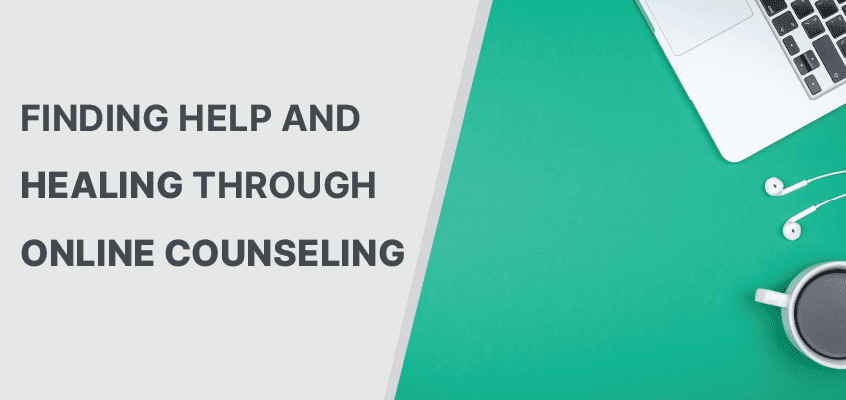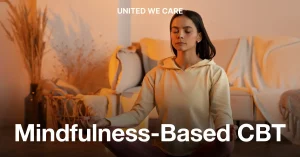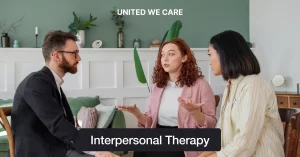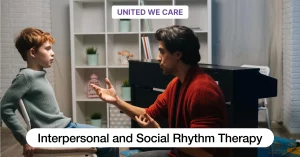Introduction
While few psychologists used to offer therapy online before COVID-19, this practice has become common. This article explores how a person can find help and heal through online counselling.
What Is Online Counseling?
Online counselling delivers therapy interventions using technology like videoconferencing, apps, phone calls, texts, and emails. It usually requires an internet connection and a prior discussion between the client and the counsellor.
There are many other names for online counselling, such as telemental health, tele-psychotherapy, web counselling, remote therapy, e-therapy, mobile therapy, etc. Some people have different opinions about what online counselling means. However, Richards and Viganó in 2012 gave a simple definition. They say online counselling is when a trained counsellor uses computers to talk to clients online. It can be the only way they talk, or other counselling methods can use it [2].
How Can Online Counseling Help You?
Online counselling offers many benefits besides the healing and help it offers. Studies have revealed that online counselling using video-based sessions is as effective as in-person sessions, mainly when anxiety or depression is targeted [3]. Further, other modalities like telephone counselling have also been effective [4]. Thus, online counselling will help individuals heal and deal with their issues effectively.
There are many other advantages of online counselling. These are below [5]:
- Reduction in Costs: Online counselling can be cheaper for the client, for the costs of travelling and disruption in routine are lower.
- Convenient to schedule: It may also be easy to prepare for individuals with busy routines and little time to devote to other endeavours.
- Managing efficiently The stigma associated with counselling: There is still a stigma associated with counselling in many places. Many individuals avoid going to counsellors because of the labels and questions that come with them. Here, online counselling has an advantage and can be more secretive.
- More accessibility: Online counselling is also more accessible from remote locations. Many individuals may live in areas where counsellors are less available. Still, others may wish to work with a counsellor who is unavailable in their city. The online medium provides a solution to these problems.
- Clients often feel more in control: In their review of studies on online counselling, Simpson and Reid found that many clients reported feeling a higher sense of control, less intimidation, and less pressure when attending sessions online [5]. The distance in online sessions can provide the client a sense of safety, whereas sometimes offline sessions may threaten.
In sum, online counselling has many benefits, which range from convenience to easier accessibility and more control. Further, the effects of modalities like videoconferencing are similar to that of in-person therapy, while other forms have the potential to provide some degree of help to the client.
What To Expect From Online Counseling?
It can be daunting to begin psychotherapy in an online setup. However, one must remember that it is a convenient and highly accessible medium to get help for one’s problems.
When beginning with online counselling, one can expect, first and foremost, a safe and confidential space to talk about their feelings, concerns, and issues. Interventions based on the client’s needs, a discussion about goals, and the client discussing the boundaries of their working relationship with the counsellor and set can also be expected. The counsellor can also suggest some tasks, activities, or self-work to increase the effect of counselling.
Depending on the type of online counselling, the counsellor will be present with the client. Usually, in email or text-based counselling, there is less of a presence of a counsellor, and replies may take time. On the contrary, telephonic and video-based online counselling provide space for more company and connection, with video-based sessions being closest to in-person sessions.
5 Top Tips For Getting The Most From Online Counselling?
Online counselling can be a person’s doorway to help and heal. There might be some doubt about the process and challenges unique to online counselling. The following tips can help you get the most out of the online counselling process:
- Research about the therapist: While this tip applies to all types of sessions, it is essential to choose the right therapist [6]. Different individuals have different expertise and ways of working, and thus, it is necessary to research them and ensure that their knowledge and your goals align.
- Schedule the session properly: It is essential to have a designated space and time where one can have privacy and minimal distractions. One best practice is to inform others that this hour will be blocked [6] [7].
- Perform Technological Checks and Keep Backups: Glitches can interfere with online counselling, which is heavily dependent on internet facilities and technology. It can be helpful to run technology checks before a session and keep alternatives ready in case something comes up during the session [6] [7].
- Have a ritual post the session: In offline counselling, the individual gets some time alone after the session. This space can provide space to process, decompress, and calm themselves before returning to life. Hence, one can create a post-session ritual [7] [Example: walking alone after the session].
- Communicate your concerns and feedback to the therapist: If, at any point during sessions, a problem such as a doubt, a technological issue, or an input emerges, it is best to share it with the therapist.
Online counselling can be fruitful if we tackle these fundamental issues early on.
How Do You Get Started With Online Counselling At UWC?
Finding experts and psychologists online can be overwhelming. However, the United We Care platform offers a simple solution. The website lists a range of qualified professionals with training and experience in counseling and mental health.
One can access this expertise by scrolling through the “Professionals” [8] page on the United We Care Website. After filling in basic details about what type of help one requires, the website lists several professionals who might be able to help the person. The user will need to select the professional they wish to consult and book the session according to availability.
Conclusion
Online counselling is a much more convenient and accessible method of receiving help from qualified professionals, and research shows that it can help individuals deal with their issues effectively. One can get the best out of online counselling by following simple procedures like scheduling properly, doing technological checks, and having a post-session ritual. The United We Care platform has a range of psychologists who offer online counselling for different concerns.
References
- K. MacMullin, P. Jerry, and K. Cook, “Psychotherapist experiences with telepsychotherapy: Pre covid-19 lessons for a post covid-19 world.” Journal of Psychotherapy Integration, vol. 30, no. 2, pp. 248–264, 2020.
- D. Richards and N. Viganó, “Online counseling: A narrative and critical review of the literature,” Journal of Clinical Psychology, vol. 69, no. 9, pp. 994–1011, 2013.
- E. Fernandez, Y. Woldgabreal, A. Day, T. Pham, B. Gleich, and E. Aboujaoude, “Live psychotherapy by video versus in‐person: A meta‐analysis of efficacy and its relationship to types and targets of treatment,” Clinical Psychology & Psychotherapy, vol. 28, no. 6, pp. 1535–1549, 2021.
- T. A. Badger, C. Segrin, J. T. Hepworth, A. Pasvogel, K. Weihs, and A. M. Lopez, “Telephone-delivered health education and interpersonal counseling improve quality of life for Latinas with breast cancer and their supportive partners,” Psycho-Oncology, vol. 22, no. 5, pp. 1035–1042, 2012.
- S. G. Simpson and C. L. Reid, “Therapeutic alliance in videoconferencing psychotherapy: A Review,” Australian Journal of Rural Health, vol. 22, no. 6, pp. 280–299, 2014.
- M. S. Nicole Arzt, “Getting the most from online therapy: Our top 8 insider tips,” Innerbody, 04-Jan-2022. [Online]. Available here: [Accessed: 26-Apr-2023].
- “10 tips for online counseling and therapy,” Counselling Directory. [Online]. Available here: [Accessed: 26-Apr-2023].
- “Find the right professional – united we care,” Find the Right Professional – United We Care. [Online]. Available here: . [Accessed: 26-Apr-2023].









